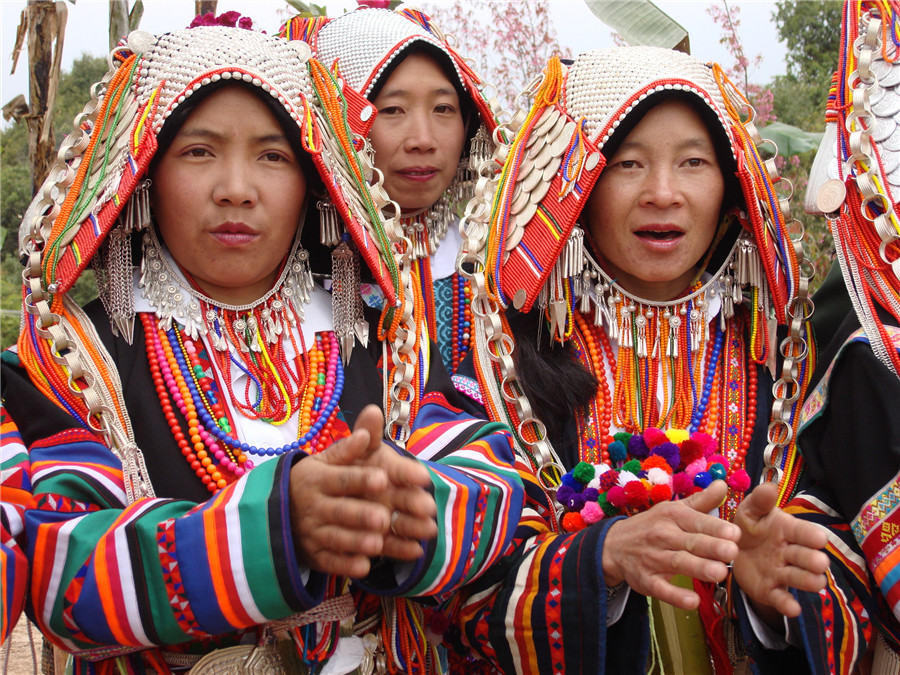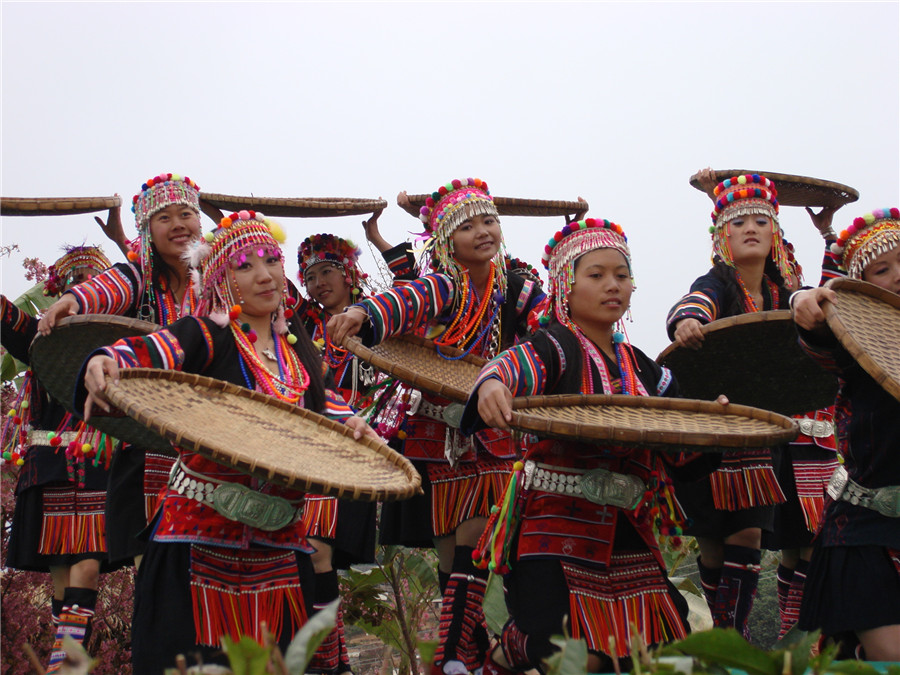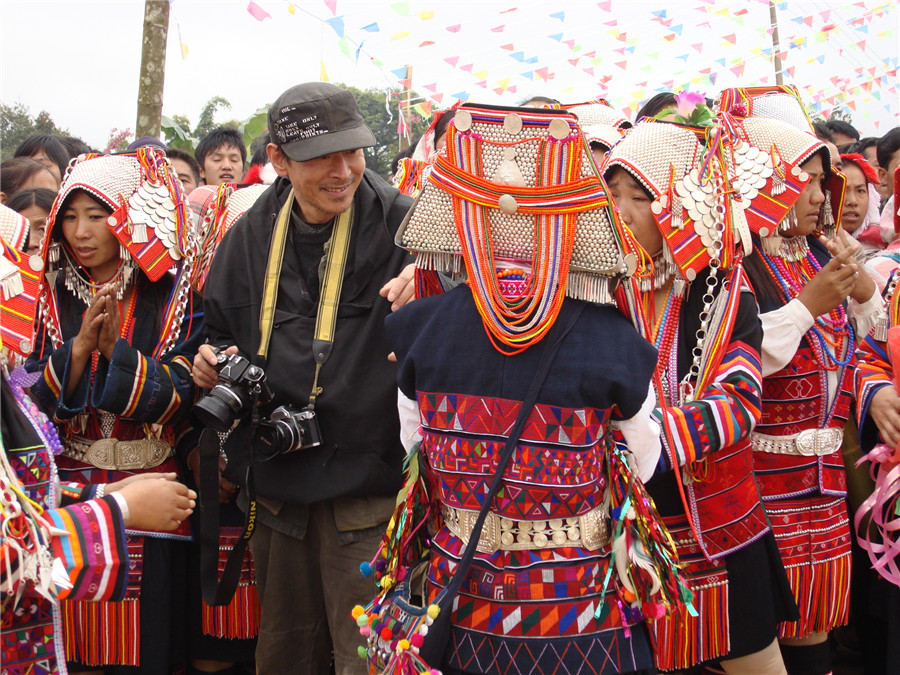Gatangpa Festival of Aini Ethnic People in XishuangBanna
Chinese Name: 哈尼族嘎汤帕节
English Name: Gatangpa Festival of Aini Ethnic People in XishuangBanna
Gatangpa Festival, the grandest festival of the Aini (a branch of Hani) ethnic members, was held on 1 January 2013 in Pazhen Village of Menghai County where the 60th anniversary of Galanghe Hani Autonomous Township synchronised.What highlighted the event was the unique ethnic customs, religious beliefs, dietary culture and traditional fineries of such nationalities as the Han, Hani, Dai, and Lahu etc, giving full play to the diverse local ethnic cultures.

In Hani ethnic language “Gatangpa” means the renewal of everything on the earth, and the beginning of a new year. Gatangpa Festival is a traditional festival in Hani minority. It is told that in ancient times Gatangpa Festival could last for 15 days, taking ancestor worship and entertaining as the main content. The festival duration was changed to four days by the 14th Hani ancestor Zyuq Tanq Panq. As prescribed, the Festival starts from the first ox day and ends at the dragon day in each October.

Menghai is a vital tea planting area in Yunnan as well as the origin of the world famous Pu’er tea. Tea is a necessity to the Hanis in Menghai for festivals, celebrations and yet social life; the grand tea sacrificial ceremony, which manifests the harmony maintained between the nature and Hanis, is one of the dominating activities during the festival.

As the grandest and traditional festival of Hani People, Gatangpa is spent annually as the “New Year Festival” of Hani group. It plays a vital role in the ethnic cultures and numerous ethnic festival celebrations of Xishuangbanna Prefecture, and is an indispensable platform to display traditional ethnic cultures and propel the unity between different nationalities of Xishuangbanna.
Gatangpa Festival
Gatangpa Festival is the main festival of the Hani ethnic group in Xishuangbanna. The term “Gatang” in the Hani language has been interpreted in various ways; some say it refers to an era name, as the Hani people call their era “Gatang Era.” However, most people believe that “Gatangpa” signifies the renewal of all things or the revival of nature, marking the beginning of a new year. In July 1987, the Standing Committee of the Xishuangbanna Prefecture People’s Congress, in accordance with the collective wishes of the Hani people across the prefecture, officially designated Gatangpa Festival as the Hani ethnic group’s New Year festival.
Festival Traditions
Although the Gatangpa Festival has long been a traditional holiday for the Hani people, it did not have a unified date in the past. It is said that in ancient times, the Gatangpa Festival lasted for 15 days, primarily involving ancestor worship and feasting. During these 15 days, banquets and drinking were held daily, leading to significant expenses. By the time of the 14th-generation Hani ancestor, Zun Tangpan, the festival duration was set to four days, beginning on the first Ox day of October and ending on the Dragon day. The festival activities retained the traditional practices of ancestor worship and feasting and added entertainment activities. During the festival, people brew rice wine, pound sticky rice cakes, slaughter pigs and chickens, and prepare offerings of rice, sticky rice cakes, rice wine, meat, and tea to present before the ancestral shrine, the Apeiboluo, to pray and make offerings. Every household hosts banquets, inviting friends and relatives to drink together and exchange gifts to strengthen bonds. Villages set up swings and tops for activities like swinging and top-spinning. Young men and women dress in new clothes, go to the mountains to pick wild fruits and flowers, sing songs, and enjoy themselves. Men who enjoy hunting form groups of three to five to hunt birds or chase animals in the mountains.
Current Festival Status
In 1987, the Standing Committee of the Xishuangbanna Prefecture People’s Congress established Gatangpa Festival as the Hani ethnic group’s New Year festival, standardizing the celebration from January 2 to 4 on the Gregorian calendar. The festival activities are organized by township governments or village committees, focusing on cultural and sports activities. During the festival, young men and women perform traditional bamboo tube dances, long bamboo pole dances, and various cultural programs showcasing Hani customs. Competitions and spring outings such as swinging, top-spinning, and crossbow shooting are held. Singing on the mountains and enjoying oneself is a key part of the festivities. Many activities with feudal superstitious elements from the past have been replaced by healthy and beneficial cultural and sports activities.

 7 Days GolfingTour
7 Days GolfingTour
 8 Days Group Tour
8 Days Group Tour
 8 Days Yunnan Tour
8 Days Yunnan Tour
 7 Days Shangri La Hiking
7 Days Shangri La Hiking
 11 Days Yunnan Tour
11 Days Yunnan Tour
 6 Days Yuanyang Terraces
6 Days Yuanyang Terraces
 11 Days Yunnan Tour
11 Days Yunnan Tour
 8 Days South Yunnan
8 Days South Yunnan
 7 Days Tea Tour
7 Days Tea Tour
 8 Days Muslim Tour
8 Days Muslim Tour
 12 Days Self-Driving
12 Days Self-Driving
 4 Days Haba Climbing
4 Days Haba Climbing
 Tiger Leaping Gorge
Tiger Leaping Gorge
 Stone Forest
Stone Forest
 Yunnan-Tibet
Yunnan-Tibet
 Hani Rice Terraces
Hani Rice Terraces
 Kunming
Kunming
 Lijiang
Lijiang
 Shangri-la
Shangri-la
 Dali
Dali
 XishuangBanna
XishuangBanna
 Honghe
Honghe
 Kunming
Kunming
 Lijiang
Lijiang
 Shangri-la
Shangri-la
 Yuanyang Rice Terraces
Yuanyang Rice Terraces
 Nujiang
Nujiang
 XishuangBanna
XishuangBanna
 Spring City Golf
Spring City Golf
 Snow Mountain Golf
Snow Mountain Golf
 Stone Mountain Golf
Stone Mountain Golf














good afternoon
we are two persons interesting in a yunnan tour, we would like to visit the following :
-different ethnic minorities in Jinghong aera
-mountain tea jingmai (villages) – Menghai
-Chuxiong (park and ancient town) Yuanmou earth scene
-Yuangyang
NO STONE FOREST – NO DALI – NO LIJIANG (already seen)
which is best season to visit? we can stay about 10/11 days
we think we will arrive in Kunming
thanks for your replay
FARINA
4 Days Puer Tea Culture Tour with Jingmai Tea Mountains and Traditional Ethnic Villageshttps://www.yunnanexploration.com/tours/4-days-puer-tea-culture-tour-with-jingmai-tea-mountains-and-traditional-ethnic-villages
2 Days Yuanmou Earth Forest Tour from Kunming
https://www.yunnanexploration.com/tours/2-days-yuanmou-earth-forest-tour-from-kunming
Your Yunnan tour can be arranged like this:
Day 1 Arrive in Puer
Day 2 Puer-Laodabao-Jingmai
Day 3 Jingmai-Menghai
Day 3 Menghai-Jinghong
Day 4 Jinghong
Day 5 Jinghong-Yuanjiang by speed train, car to Yuanyang
Day 6: Yuanyang
Day 7 Yuanyang-Jianshui
Day 8: Jianshui-Stone Forest
Day 9: Stone Forest to Chuxiong by speed train
Day 10: Chuxiong-Yuanmou
Day 11: Yuanmou-Kunming
Day 12:Departure from Kunming